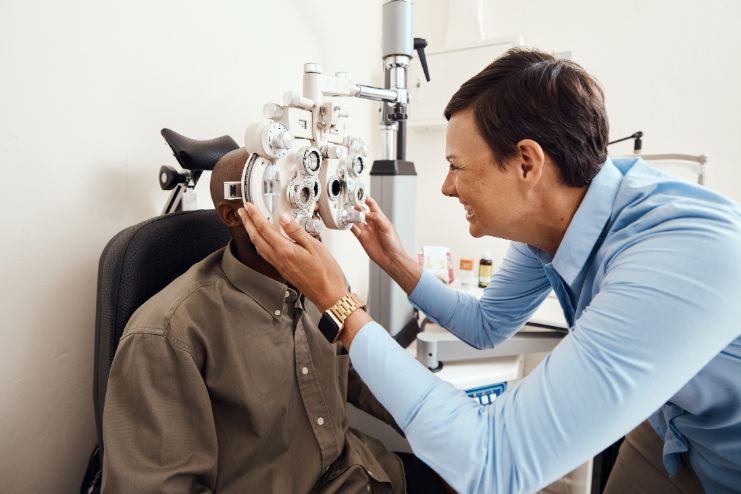We’ve all been there – your eyes feel strained, exhaustion sets in, and almost instinctively, your hands move to rub your tired eyes. It’s a common habit that many find oddly comforting, especially when dealing with seasonal allergies, digital eye strain, or simple fatigue. That gentle pressure against your eyelids can feel like instant relief, similar to hitting a refresh button for your vision.
However, this seemingly innocent habit often becomes automatic. We do it without thinking, responding unconsciously to discomfort or irritation. Various triggers, from environmental allergens to extended screen time, can prompt this potentially harmful behavior.
While it may appear harmless, it’s time to reconsider this habit. The damage caused by this simple action might surprise you. Join us as we uncover ten unexpected risks associated with eye rubbing and learn why breaking this habit is crucial for maintaining optimal eye health and vision clarity.
Read More: Castor Oil for Dry Eyes – Does it work?
Risks of Eye Rubbing

Your eyes represent one of your body’s most sensitive organs, perhaps the most delicate of all. Despite their resilience, casual handling can potentially compromise both your eye health and visual acuity.
Considering the critical nature of protecting your sensory organs, persistent eye rubbing may lead to infections and other complications you might not be aware of.
Here are the main consequences of rubbing your eyes:
1. Keratoconus
Excessive eye rubbing can cause the cornea to become progressively thinner and more distorted, leading to a serious condition known as keratoconus. This irreversible corneal disorder can significantly impact your vision quality. The cornea plays a vital role in your eyesight by directing light rays to the lens to create clear, focused images. While vision problems can often be managed with prescription eyewear or specialized contact lenses, severe cases of eye rubbing-induced damage may ultimately require corneal transplant surgery.
2. Red Eyes
Vigorous eye rubbing can rupture the tiny blood vessels in your eyes, resulting in a conjunctival hemorrhage. This weakens the eye structure and causes visible redness. As the leaked blood seeps into the surrounding tissue, it can create noticeable dark circles beneath your eyes.
Read More: 16 Effective Cures For Dry Eyes That Work Like Magic
3. An Increase in Eye Pressure
Individuals diagnosed with conditions like keratoconus, progressive myopia, or glaucoma (where elevated eye pressure damages the optic nerve) face increased risks when regularly engaging in activities that raise their intraocular pressure.
While brief episodes of increased intraocular pressure from gentle eye rubbing are generally harmless, aggressive and prolonged rubbing—sometimes lasting minutes and occurring over years—can mechanically stress and stretch the eye tissues. This persistent strain may accelerate disease progression or worsen existing conditions.
4. Bacteria
Manual contact with your eyes can introduce harmful bacteria that may cause infections. Despite regular hand washing, bacteria persist on our hands. Our daily interactions with various surfaces expose us to countless microorganisms. Since these germs are invisible to the naked eye, the safest approach is to avoid eye contact with your hands altogether.
5. Scratches
Foreign particles entering the eye can cause microscopic corneal scratches, leading to various complications. Eye rubbing can worsen any existing corneal damage, making it crucial to resist the urge. These micro-abrasions often result in eye discomfort, compromised vision, heightened light sensitivity, and excessive tearing.
Read More: How to Treat Headaches Behind The Eyes
6. Induction of Inflammation
Eye irritation often triggers rubbing reflexes. For allergy sufferers, rubbing the periocular area can release histamines, creating an ongoing “itch-rub-itch” cycle. Using unwashed hands not only releases histamines and proteolytic enzymes into the tear film but also introduces bacteria and allergens, potentially causing eye inflammation.
Eye rubbing also leads to increased levels of specific proteins in tears, including matrix metalloproteinase (MMP)-9, tumor necrosis factor-α (TNF-α), and interleukin-6 (IL-6). Medical professionals have observed elevated concentrations of MMP-13, IL-6, and TNF-α in tear samples from keratoconus patients, suggesting that chronic eye rubbing likely contributes to this condition’s development.
7. Dry eyes
Frequent eye rubbing can disrupt your natural tear film, resulting in dry eye symptoms. As mentioned earlier, conditions like keratoconus can affect proper eyelid closure. When your eyelids don’t completely close, your eyes become more susceptible to dryness, making it increasingly difficult to maintain proper eye lubrication through natural blinking.
Read More: How to Get Rid of Watery Eyes
Expert Tips: How to Stop Rubbing Your Eyes

Now that we’ve explored the detrimental effects of eye rubbing, let’s examine effective strategies to prevent these risks from developing.
Here are some proven methods to help you stop rubbing your eyes:
Find the Triggers: The initial step in breaking the eye-rubbing habit is identifying what prompts this behavior. Common triggers include eye dryness, seasonal allergies, exhaustion, or discomfort from contact lenses. Understanding these triggers allows you to develop targeted solutions that address discomfort without resorting to rubbing.
Keep Your Hands Occupied: Many people unconsciously touch their eyes due to habit, boredom, or as a stress response. While momentary eye rubbing might provide temporary relief, it often leads to increased irritation, redness, and potentially serious complications. Engaging in activities that keep your hands busy can effectively break this habit.
Consider using stress-relief tools like squeeze balls, engaging in artistic activities like sketching or doodling, or utilizing fidget devices such as cubes or spinners to keep your hands productively occupied.
Apply Eye Drops or a Cold Compress: Instead of rubbing your eyes, opt for eye drops or a cold compress when experiencing dryness or inflammation. Eye drops serve a dual purpose – they help flush out potential irritants while providing relief from dryness and discomfort. A cool compress can effectively reduce inflammation and soothe the eye area. If these options aren’t readily available, you can gently splash cool water on your face and pat your eyes dry with a clean towel.
Maintain Good Hygiene: Eye irritation, which often triggers rubbing, frequently stems from exposure to environmental irritants like dust, pollen, or microorganisms. Implementing proper hygiene practices can significantly reduce the risk of these irritants affecting your eyes. Make thorough hand washing with soap and water a regular practice, especially before any contact with your face or eyes. Additionally, avoid sharing personal items such as cosmetic applicators or face towels, as these can transfer harmful bacteria and cause eye irritation.
Treat Underlying Eye Conditions: Persistent eye rubbing might indicate underlying ocular conditions such as chronic dryness or allergic reactions. If you notice a constant urge to rub your eyes, consulting an eye care specialist is recommended. They can conduct a thorough examination to identify potential issues and recommend appropriate treatment strategies.
Read More: How to Remove Bags Under Eyes
When to See an Eye Doctor

While occasional eye rubbing might seem harmless, certain symptoms should never be ignored. Seek professional attention if you experience persistent redness, vision changes, ocular pain, excessive tearing, photophobia, or a sensation of grittiness. These symptoms could indicate serious conditions like early-stage glaucoma, corneal damage, or ocular infections.
Schedule an immediate appointment with an eye care specialist if eye rubbing results in ongoing irritation, inflammation, or discomfort. Early detection is crucial for minimizing complications and preventing permanent vision problems.
Regular eye examinations are essential, regardless of whether you require vision correction. These check-ups help maintain optimal vision, track changes in ocular health, and enable early detection of potential issues. Remember, preventive eye care is your best defense against vision problems, so prioritize professional eye care as part of your overall health routine.
Read More: Dry Eyes: 10 Best Eye Drops 2021; Causes, Symptoms, Treatment
Conclusion
While seemingly harmless, eye rubbing can trigger numerous detrimental effects, ranging from cosmetic concerns like dark circles to serious vision complications including allergic reactions, corneal abrasions, infections, and progressive conditions like keratoconus. This simple reflexive action can silently damage one of your body’s most delicate and vital organs – your eyes.
Breaking any habitual behavior, particularly unconscious ones, presents its challenges. However, by implementing small but significant changes like using appropriate eye drops, maintaining stringent hygiene practices, and scheduling regular eye examinations, you can effectively minimize discomfort and protect your precious vision for years to come.
Your eyesight is an invaluable asset that deserves utmost care and attention. So take a deep breath, resist the urge to rub, and embrace healthier eye care habits.
References
- https://visioneyeinstitute.com.au/eyematters/dangers-rubbing-eyes/
- https://mydryeyedisease.com/5-risks-of-rubbing-your-eyes/
- https://defeatkeratoconus.com/eye-rubbing-risks/
- https://eyelasersurgerysydney.com.au/5-reasons-rubbing-eyes-is-dangerous/
- https://healthcare.utah.edu/healthfeed/2023/07/why-you-should-stop-rubbing-your-eyes
- https://defeatkeratoconus.com/eye-rubbing-tips/
- https://www.talleyeyeinstitute.com/eye-health-resources
- https://www.visioncare.com/eye-rubbing-prevention
- https://eyecareprofessionals.com/stop-eye-rubbing
In this Article




















